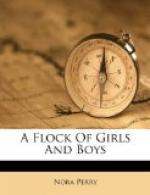Mary Marcy was a shrewd girl as well as an observant one, and she laughed in her sleeve as she heard this.
“Composition! that was no school composition”, she said to herself; and when a few minutes later the bell rang for the close of recess, and she saw Nelly send a significant glance to Lizzy as the two hurried to their seats, this shrewd, observant Mary was surer than ever that there was mischief going on, and when she went home that afternoon she told her mother what she had seen and heard, and how she felt about it,—for Mary was very confidential with her mother, and told her most of her school secrets. Mrs. Marcy listened to this telling with that placid Quaker way of hers, and remarked in her quaint Quaker phrase, “Thee mustn’t be too suspicious, my dear; it maybe harmless mischief, after all.” And then Mary had replied, “I shouldn’t be suspicious of any of the other girls, mother; but Lizzy and Nelly Ryder are always doing and saying the mischievous things that have a sting in them;” and Mrs. Marcy, spite of her Quaker charity, then admitted that she had never quite liked the ways of those girls, and had often been sorry that they were in the Westboro’ High School; “but, poor things,” she added the moment she had made this admission, “they are more to be pitied than the persons they hurt, for they can get over the hurt, but these poor girls can’t get over their own wrong-doing so easily. It makes a black mark on them every time, and black marks are hard to rub off; and thee’ll see if they are up to any wrong-doing now, it will leave a mark, and so they’ll get the worst of it in the long run.”
“But it’s always such a long run before a mark of that kind shows,” laughed Mary. “Girls of that sort seem to succeed in making everybody but themselves uncomfortable, and these two specially always appear to be so gay and full of good times with their giggle and chatter.”
“But the Bible says, Mary, ’for as the crackling of thorns under a pot, so is the laughter of the fool;’ and thee can think of this the next time thee hears the chatter, and then thee can say to thyself, ’It may be nothing but foolish folly, after all.’”
“Yes, it may be nothing but that,” Mary allowed; but when the next morning she heard it again, her first doubts and suspicions returned in full force, and she said to herself, “I’m perfectly sure that there’s something more than mere foolishness in this crackling of thorns. I’m perfectly sure there’s mischief with a sting in it. I feel it in the air, and I’m just going to watch out and see if I can’t stop it as I did that horrid St. Valentine business last winter.”
And while good kind Mary was thus “watching out” for this mischief, there, only two or three seats away from her, sat Angela Jocelyn, about whom all the mischief was gathering as a dark cloud gathers over a fair sky. And Angela’s sky was particularly fair to her just then, for she had been made very happy by the invitation she had received that morning,—so happy that she had said to her elder sister, Martha Jocelyn, “To think of Marian Selwyn’s inviting me. Isn’t it beautiful of her?” and Martha had answered back rather tartly, “I don’t see why you should put such an emphasis on ‘me,’ as if you were so inferior. You’re as good as Marian Selwyn.”




